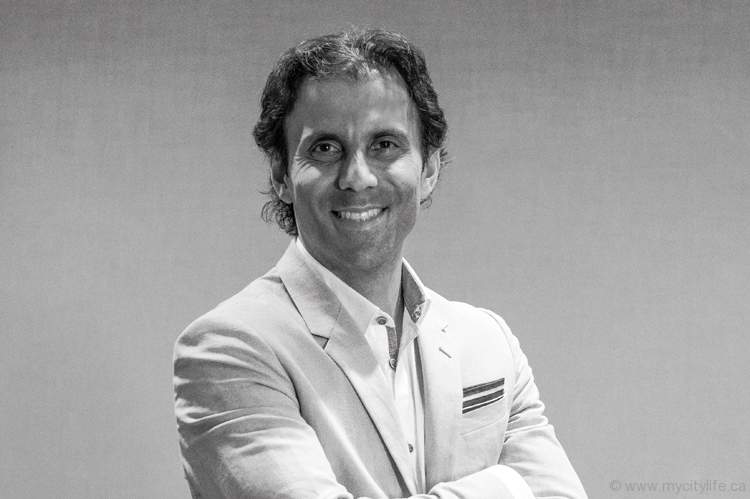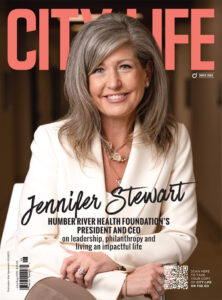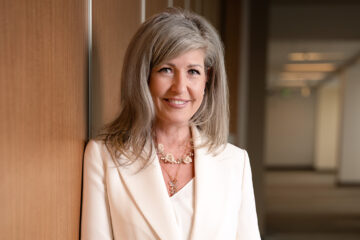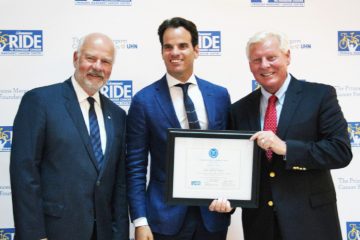Dr. Tony Finelli – Robo Doc

We spend an early morning with Dr. Tony Finelli, one of Toronto’s leading surgical oncologists and the recipient of Prostate Cancer Canada’s 2015 Mark Dailey Award recognizing his pioneering work in minimally invasive robotic surgery.
Doctor Tony Finelli is nowhere to be found in the Princess Margaret Cancer Centre’s Sam Gartner Concourse. We were supposed to meet here, in the rear lobby, at 7 a.m. But we can’t seem to pinpoint each other in the crowd of early morning patients and medical staff. I send him a text to let him know where I am and that I can’t seem to locate him. A quick phone call and the reason why materializes. The Sam Gartner Concourse isn’t in the Princess Margaret hospital. It’s in Mount Sinai Hospital, one building south. I’m in the wrong place.
This is a problem — a small problem, but a problem nonetheless. You don’t want to waste Dr. Finelli’s time. Or more accurately, you shouldn’t waste Dr. Finelli’s time. He’s one of the city’s leading surgical oncologists, the man responsible for operating on around 200 patients with prostate and kidney cancer every year. People’s lives literally depend on him, and here I am squandering his minutes because of an early-morning haze and an inability to walk into the right building.
I dash out the doors and stride north toward the proper destination. Dr. Finelli is sporting a pale-blue blazer, white dress shirt and swept-back hair that exudes approachable professionalism. He gives a single wave from atop the quiet Murray Street entrance before strolling jauntily down the ramp with a hand stretched out and a cheek-to-cheek grin. It’s only a few minutes after seven on a mild Thursday morning, but judging by Dr. Finelli’s energy you would think it’s closer to noon. One wonders how he summons so much gusto at this ungodly hour.
“I’m always smiling,” he says after we’ve moved up to the boardroom of the hospital’s Robert & Maggie Bras and Family New Drug Development Program. He explains that he doesn’t understand doctors who aren’t happy, especially given the nature of their work. “I always tell students who are desiring a medical career that it’s one of the few industries in the world where 99 per cent of patients are grateful. To me, that’s the most rewarding.”
For the past 10 years, Dr. Finelli has not only solidified his name as one of Toronto’s best uro-oncologists (doctors who focus on cancers of both the urinary system and male reproductive system), but as one of the city’s top doctors. He’s helped pioneer minimally invasive surgery for urologic cancers in Ontario and this work has taken him all over the world. It’s also brought him to the lead of both the Princess Margaret and Cancer Care Ontario’s Genitourinary Cancer Group (medical, surgical and radiation organizations that care for prostate, kidney, bladder and testes cancer). Sprinkle on some medical research and teaching at the University of Toronto Medical School, as well as the responsibilities of his recent appointment as the new chief of urology at the University Health Network, and you can see why every minute of his day is precious. “I love my wife and my kids, and I could never be where I was if it wasn’t for them,” he chuckles after we break down his resumé. Early mornings and 12-hour days are just par for the course.
While all these accolades are respectable in and of themselves, what’s really thrust Dr. Finelli to the forefront of the medical world is his work in minimally invasive surgery, specifically using the da Vinci Surgical System. Traditional open prostate surgery, for example, involves making a seven-centimetre incision across the abdomen to gain access to the organ. But by using the da Vinci robotic surgical system, Dr. Finelli can perform the same procedure using only a few small incisions to remove the prostate with greater precision and less blood loss. The machine’s robotic arms also rotate 360 degrees, “allowing you to position your instruments for the best possible angle to either cut or sew something,” he explains. It’s all part of a movement that’s become central to many cancer treatments, where it’s no longer just about cancer control and
improving cures.
“We’re always trying to diminish harm and impact on quality of life”
— Dr. Tony Finelli
“We’re always trying to diminish harm and impact on quality of life,” he says. And those efforts are making headway. The year before Princess Margaret recruited Dr. Finelli in 2005, only four per cent of all urologic cancer surgery was minimally invasive. Today that number’s been raised to one-third. “So we’re growing,” he adds.
Because of his proficiency in minimally invasive robotic surgery, Dr. Finelli has served as a mentor to surgeons in Ontario who have adopted robotic surgery. He’s also gained international attention. He’s operated in more than 10 countries around the world — Italy, China, India, Venezuela, Saudi Arabia, just to name a few — and has given demonstrations on laparoscopic surgeries and their benefits.
“Our mission is to help other surgeons learn how to do things safely,” he explains of his demonstrative work. So while his primary focus is the care of patients at the Princess Margaret Cancer Centre, “a real part of my agenda is I strongly believe in dispersing knowledge and ability nationally and internationally so that everyone benefits.”
Those that are well acquainted with Dr. Finelli will tell you that this isn’t all talk, either. Dr. Neil Fleshner, who was the chief of urology at the University Health Network for the past 14 years before Dr. Finelli took over, describes his colleague as multi-talented, meticulous and always eager to learn. His leadership capacity makes him ideal to helm the department, as does his team-player mentality. Dr. Fleshner describes a time several years ago when he and Dr. Finelli were engaging in a new minimally invasive procedure called high-intensity focused ultrasound. Because it was such a new procedure, the first case Dr. Fleshner took on was intimidating. “It was all new to us,” says Dr. Fleshner, who also recruited Dr. Finelli to Princess Margaret back in 2005. “Instead of saying ‘It’s your problem,’ he stuck through with me in the trenches, and everything turned out to be fine for the patient.” When you’re faced with such anxiety-provoking prospects you don’t want to be left out in the cold, exposed and on your own. “And he was that kind of guy that didn’t leave you alone.”
Rocco Rossi, president and CEO of Prostate Cancer Canada, appreciates Dr. Finelli’s work in nerve-sparring surgical techniques as well as his frank, open and approachable nature. But he also values Dr. Finelli’s willingness to put in the extra time, as limited as it may be, to continuing the dialogue around prostate cancer. “He’s someone who could just be in practice and yet he spends that additional time participating in a number of research studies, but then over and above that, also speaks on the issue and volunteers in a variety of ways to contribute back to the community.”
One such contribution to the community is Dr. Finelli’s dedication to the Road Hockey to Conquer Cancer in support of the Princess Margaret hospital. He’s captained his team, the Mighty Docs, every year since the event launched in 2011, with the team raising over $215,000 for the cause — $65,000 of that being generated personally by him. He’s even been one of the event’s honorary chairs every year it’s been running.
Because of his work and attitude, Dr. Finelli is receiving Prostate Cancer Canada’s 2015 Mark Dailey Local Hero Award. The annual award recognizes a major contributor in the treatment of prostate cancer. It’s given in honour of Mark Dailey, the CityNews journalist who passed away from cancer in 2010. And because of his prostate cancer advocacy, the recipient of the award isn’t chosen carelessly. “We guard and hold that memory of Mark Dailey in incredibly high regard,” Rossi explains, “and so we’re looking for people of the utmost character and contribution to recognize with this award.”
For Rossi, there are plenty out there in the medical world that get labelled as “world-class.” But just like any other profession, there are those that lead the pack and those that do not. It’s like in the NHL, Rossi explains. You might be watching the greatest players in the world, but at the end of the game there are still only three stars. “And when it comes to surgery and prostate cancer,” says Rossi, “this guy is one of those.”
While he’s blazing new ground in minimally invasive surgery today, Dr. Finelli’s roots are as modest as his demeanour. His mother and father moved from Italy to Toronto in the late 1950s and “like many immigrant stories, they essentially came to this country with a suitcase but incredible work ethic.” He describes his family home as a traditional Italian household. He and his brother would learn the value of hard work by lending a hand to their parents — whether it was in the kitchen, the garden, around the house. “Whatever facet of the day required effort, we were always engaged in helping,” he says.
As a student he enjoyed science and math, and found his curiosity sparked by subjects such as biology and human anatomy. But it never really struck him to pursue medicine until he was enrolled at the University of Toronto. “I realized that medicine would fulfil all of my career desires, meaning teaching and taking care of people and being in the sciences,” he says. He began to gravitate toward oncology because of the amount of suffering he saw in patients; it was here he felt that he could do the most good. He became interested in prostate cancer care back in 1993 when he was working as a medical student in research, and when he entered his resident training in 1996 he began to learn to operate.
“A real part of my agenda is I strongly believe in dispersing knowledge and ability nationally and internationally so that everyone benefits”
— Dr. Tony Finelli
“It was during those formative years that I realized that although we performed great surgery through large incisions, there’s a lot of pain and recovery involved, and with such great technology around us, why aren’t we trying to harness that technology and bring it into surgery?”
He would eventually make his way to the prestigious Cleveland Clinic, where he worked with one of the pioneers in the field of minimally invasive surgery, Dr. Inderjit Gill. While training with Dr. Gill, he learned to perform advanced laparoscopic and robotic surgery.
While there are plenty of benefits to minimally invasive robotic surgery, it’s still a controversial practice. The big issue being what most technological advances are faced with: money. A hospital needs roughly $5 million to get a robotics program up and running and the funds don’t come from the government — it’s all philanthropically financed. While the Princess Margaret hospital was fortunately gifted the funds by the Muzzo family in 2008, Dr. Finelli feels that, overall, the cost is relative. Within the realm of surgery a $5-million robotic program is definitely expensive, but: “If you look at the cost of the robotic surgery versus some of the drugs that are being given for patients for their cancers or some of the radiation technologies, this is relatively inexpensive,” Dr. Finelli explains.
Dr. Finelli believes there will always be a role for traditional open surgery, but the momentum is heading in the direction of surgery becoming continuously less invasive. He extrapolates the potential of today’s current technology, imagining better fibre optics, improved magnification and vision, and new tech that overlays imaging onto organs so that during surgery the surgeon can see the details discovered by CAT scans or MRIs. “This is where, I think, the drive is going,” he explains. Health care in Canada doesn’t adopt new technology as fast as other industries, which can partially be attributed to it being a cost creator as opposed to a revenue generator. But this isn’t such a bad thing. “I think that’s because of our concern of safety and a culture of critical evaluation before we accept and adopt something,” he says.
This idea of critical evaluation is also important to Dr. Finelli. When asked about his most memorable surgeries, he acknowledges that, yes, there are times when he’s proud of his performance. But he believes surgeons must always engage in a practice of “continuous surgical education” and have an appetite for improvement. “I think surgeons should be aware of their own results, should review videos of their surgeries to continuously improve and should go and observe others in the field to see what they can learn,” he says. “I think that’s very important.”
In regards to his own future, Dr. Finelli, 46, feels he’s already met most of his surgical goals. And while his focus is still on providing the best care to his patients, he’s also examining the system itself and how it can be fine-tuned to better serve the public. How can these robotic-assisted surgeries be brought to the masses? How can a culture of continuous surgical improvement be implemented without it feeling like a witch hunt? These are the big questions Dr. Finelli has set his sights on. “I’d love to see a community of practice where all surgeons together, either through peer review or self-review, are striving to improve continuously. That would be the ultimate vision,” says Dr. Finelli.
And now that he’s sitting as the chief of urology at the University Health Network, does he see that vision coming to life?
“I think so,” he says, adding with a smile, “Well, I am going to have a say in it.”
All he needs, it seems, is time. So better not waste any more.
Photo By Carlos Arturo Pinto
















































































No Comment